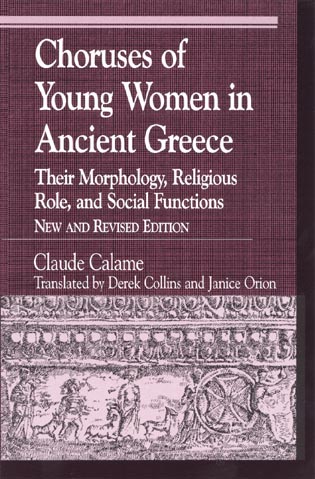Greek Studies: Interdisciplinary Approaches
Foreword by Gregory Nagy, General Editor
 Les choeurs de jeunes filles en Grèce archaïque, by Claude Calame, was originally published in 1977. Over the succeeding years, it gradually became recognized as a major breakthrough in the study of ancient Greek society and literature. It awakened the world of Classical scholarship to something of central importance in the cultural life of ancient Greece. This is the chorus, a singing and dancing ensemble of non-professionals who perform ad hoc, at public occasions like festivals, on behalf of the whole community. An accomplished anthropologist as well as Classicist, Calame elucidated the traditional custom of communal choral performance as a social institution that was basic to the emotional, intellectual, moral, and aesthetic formation of all who participated.
Les choeurs de jeunes filles en Grèce archaïque, by Claude Calame, was originally published in 1977. Over the succeeding years, it gradually became recognized as a major breakthrough in the study of ancient Greek society and literature. It awakened the world of Classical scholarship to something of central importance in the cultural life of ancient Greece. This is the chorus, a singing and dancing ensemble of non-professionals who perform ad hoc, at public occasions like festivals, on behalf of the whole community. An accomplished anthropologist as well as Classicist, Calame elucidated the traditional custom of communal choral performance as a social institution that was basic to the emotional, intellectual, moral, and aesthetic formation of all who participated.
Calame’s historical overview concentrates on choruses comprised of young women, but the implications of his insights extend to choruses of boys and men as well. Further, Calame’s analysis casts new light on the essence of the Classical form that we know as choral lyric poetry—not only the grand old-fashioned choral productions of Simonides, Pindar, and Bacchylides, but also the newer and more experimental ones that grew out of Athenian State Theater, as represented by Aeschylus, Sophocles, Euripides, and Aristophanes.
Just as important, the picture that emerges from Calame’s systematic survey of evidence about Archaic and Classical Greek choruses of young women forces a reassessment of Classicists’ perspectives on Sappho and her poetics. Calame has made it possible to broaden scholarly discussion, to move beyond the tired old reductionism of earlier generations of scholars who had read their own preconceptions into ancient texts, seeking facile answers to simplistic questions about Sappho’s “monodic poetry”—or even about her “lesbianism.” As Calame’s book makes clear, the poetics of Sappho can be traced back to a choral tradition, and the institutions of the chorus in turn help us reconstruct a historical context for the conventions of homoerotic self-expression.
Choruses of Young Women in Ancient Greece is a revised version of the 1977 French original (the “young women” in the title is meant to include “girls” as a sub-category). Thanks to the active collaboration of Claude Calame, who has also added new details and further bibliography, this book is the equivalent of a second edition. The series editor wishes to thank, besides those already thanked by Calame in the author’s preface to this new edition, the following scholars who generously helped proof-read the near-final version of the text: Tamara Chin, Fred Porta, and Timothy Power.
Special thanks are due to a senior Hellenist who generously read through the text and helped make numerous improvements. He modestly gave the series editor explicit instructions not to list him in the acknowledgments; his request is hereby honored, reluctantly, but his selfless contribution will always be remembered and cherished by those who know how much of his time and effort went into making this book a worthy successor to the original.
—Gregory Nagy
Building on the foundations of scholarship within the disciplines of philology, philosophy, history, and archaeology, the Greek Studies: Interdisciplinary Approaches series published by Rowman & Littlefield concerns not just the archaic and classical periods of Greek traditions but the whole continuum—along with all the discontinuities—from the second millennium BCE to the present. The aim is to enhance perspectives by applying various disciplines to problems that have in the past been treated as the exclusive concern of a single given discipline. Besides the crossing-over of the older disciplines, as in the case of historical and literary studies, the series encourages the application of such newer ones as linguistics, sociology, anthropology, and comparative literature. It also encourages encounters with current trends in methodology, especially in the realm of literary theory.
The Center for Hellenic Studies offers free access to over 100 books and articles. An online version of Choruses of Young Women in Ancient Greece, by Claude Calame, is also available on the CHS website. Are you interested in oral tradition and lyric poetry? Read online!
- Anton Bierl. 2009. Ritual and Performativity: The Chorus in Old Comedy. Hellenic Studies Series 20.
- Gregory Nagy, “Ancient Greek Elegy,” in The Oxford Handbook of the Elegy, ed. Karen Weisman (Oxford: Oxford University Press 2010.)
- Gregory Nagy, “The Delian Maidens and their Relevance to Choral Mimesis in Classical Drama,” in Choral Mediations in Greek Tragedy, ed. R. Gagné and M. G. Hopman (Cambridge: Cambridge University Press, 2013.)
- Gregory Nagy, “Lyric and Greek Myth,” in The Cambridge Companion to Greek Mythology (ed. R. D. Woodard; Cambridge University Press 2007.)
- Gregory Nagy, “Reading Greek Poetry Aloud: Evidence from the Bacchylides Papyri,” in Quaderni Urbinati di Cultura Classica 64. 2000.
- Gregory Nagy. 1990. Pindar’s Homer: The Lyric Possession of an Epic Past.
- Gregory Nagy. 1996. Poetry as Performance: Homer and Beyond.
- “Focus on Sappho,” Selections from CHS publications pertaining to the songmaking of Sappho, available online on the CHS website.
